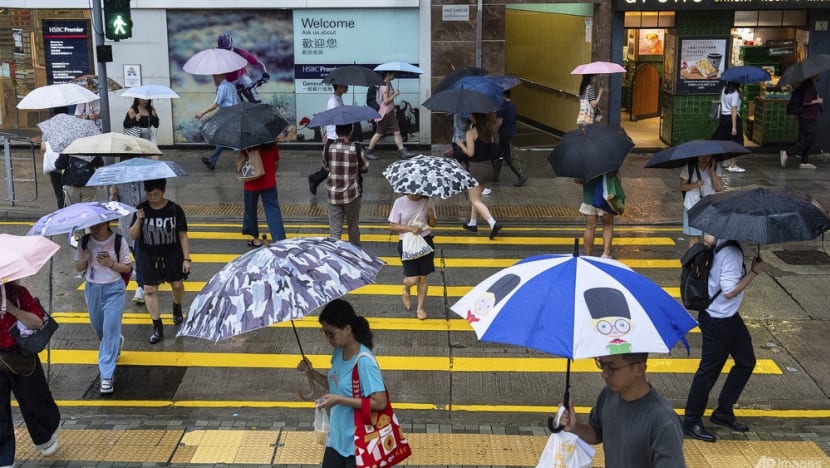Top Stories
Tropical Storm Podul Disrupts Southern China, Strikes Hong Kong

Tropical Storm Podul unleashed heavy rainfall across southern China on August 14, 2023, causing significant disruptions to schools, hospitals, and courts, particularly in Hong Kong. The storm, which had previously affected Taiwan, resulted in at least 143 injuries there before making landfall in Fujian province. As the storm battered the region, authorities issued their highest-level “black” rainstorm warning, prompting the cancellation of key court proceedings, including that of media tycoon and pro-democracy advocate Jimmy Lai.
The torrential rain, peaking at more than 70 mm per hour, led to the closure of outpatient clinics and widespread flight cancellations. According to data from Flightmaster, approximately 20 percent of flights were cancelled across various airports in the area. In Quanzhou, a significant textile and apparel export hub, over a third of flights were affected. Analysts have expressed concerns that such extreme weather events could increasingly threaten economic growth in the world’s second-largest economy.
Record Rainfall and Emergency Measures
Southern China has been grappling with unprecedented weather conditions, including record rainfall and prolonged heatwaves. Last week, the region experienced its heaviest downpour in generations, with Guangzhou receiving a staggering 622.6 mm of rain from August 2 to 6, nearly three times the city’s average for the month. Tragically, these conditions have led to at least seven fatalities and the evacuation of 75,000 residents in Guangdong.
In response to the ongoing crisis, the Chinese government announced an additional 430 million yuan (approximately US$59.9 million) in disaster relief funding. This brings the total allocated since April to at least 5.8 billion yuan. Chim Lee, a senior analyst at the Economist Intelligence Unit, emphasized the need for heightened preparedness, noting that there is growing evidence of more intense and slower-moving tropical cyclones impacting the region.
Podul initially made landfall as a typhoon before weakening to a tropical storm. It struck Fujian at 12:30 AM local time, following its destructive path through Taiwan, where winds reached up to 191 km/h. As the storm continues to move northwest at a speed of 30-35 km/h, its residual effects are expected to further impact southern China, which is still reeling from the heavy rains of the past week.
Infrastructure Challenges and Future Implications
The weather has prompted the closure of highways in Meizhou, Guangdong, with state media reporting on significant transportation disruptions. The high-speed railway connecting the technology hubs of Shenzhen and Hangzhou, located approximately 1,200 km apart, has also been suspended.
As southern China faces this latest challenge, experts warn of the potential for economic disruptions across various sectors. With the increasing frequency of such extreme weather events, there is a pressing need for enhanced infrastructure and disaster response systems to mitigate future impacts.
Overall, Tropical Storm Podul exemplifies the ongoing challenges posed by climate change and the necessity for proactive measures in safeguarding communities and economies in affected regions.
-

 World5 months ago
World5 months agoSouth Korea’s Foreign Minister Cho Hyun to Visit China This Week
-

 Business5 months ago
Business5 months agoStarling Bank Plans Secondary Share Sale, Targeting $5.4 Billion Valuation
-

 Top Stories5 months ago
Top Stories5 months agoMunsang College Celebrates 100 Years with Grand Ceremony
-

 World5 months ago
World5 months agoPAS Aims to Expand Parliamentary Influence in Upcoming Election
-

 Business7 months ago
Business7 months agoKenvue Dismisses CEO Thibaut Mongon as Strategic Review Advances
-

 Lifestyle6 months ago
Lifestyle6 months agoHumanism Camp Engages 250 Youths in Summer Fest 2025
-

 Sports6 months ago
Sports6 months agoDe Minaur Triumphs at Washington Open After Thrilling Comeback
-

 Sports7 months ago
Sports7 months agoTupou and Daugunu Join First Nations Squad for Lions Clash
-

 Top Stories7 months ago
Top Stories7 months agoColombian Senator Miguel Uribe Shows Signs of Recovery After Attack
-

 World7 months ago
World7 months agoASEAN Gears Up for Historic Joint Meeting of Foreign and Economic Ministers
-

 Health6 months ago
Health6 months agoNew Study Challenges Assumptions About Aging and Inflammation
-

 Business7 months ago
Business7 months agoOil Prices Surge Following New EU Sanctions on Russia









